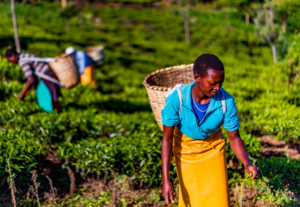|
Getting your Trinity Audio player ready...
|
Welcome to the world of sustainable agriculture, a vital force that is reshaping the way Africa feeds itself and contributing to global food security. In this blog post, we’ll delve into the fascinating realm of sustainable agriculture in Africa, exploring its innovative practices, its impact on local communities, and its potential to revolutionize farming worldwide.

The Imperative of Sustainable Agriculture
Sustainable agriculture is far from being a mere buzzword; it’s an imperative. Africa is facing the daunting challenge of its population potentially doubling by 2050, and this demographic shift brings with it a soaring demand for food. Traditional farming methods are proving inadequate to meet this burgeoning need. Unsustainable agricultural practices, including the excessive use of chemical fertilizers and pesticides, deforestation, and soil degradation, have inflicted substantial damage on the land. This harm has resulted in diminished crop yields and heightened susceptibility to the adverse impacts of climate change.
Regenerative Agriculture
Enter regenerative agriculture, a key player in the sustainable farming revolution. This approach focuses on healing the land while producing food. By emphasizing practices such as crop rotation, cover cropping, and reduced tillage, regenerative agriculture rebuilds soil health, enhances water retention, and sequesters carbon. Farmers are transitioning from monoculture to diverse cropping systems, mimicking natural ecosystems to increase resilience.
Agroforestry
Agroforestry, another sustainable agriculture practice gaining momentum, combines trees and crops on the same piece of land. This approach offers multiple benefits, from improved soil fertility to increased biodiversity and carbon sequestration. Trees provide shade, windbreaks, and valuable timber or fruit resources, while their roots prevent erosion and enrich the soil.
Precision Agriculture: High-Tech Farming for Efficiency
Precision agriculture, driven by technology, is transforming African farming. Farmers are using drones, GPS, and soil sensors to optimize planting, irrigation, and fertilization. This data-driven approach not only increases yields but also reduces resource use, making it a win-win for both farmers and the environment.
Sustainable Livestock Farming
Sustainability isn’t limited to crops; it extends to livestock farming as well. In Africa, sustainable livestock management involves rotational grazing, improved animal health, and reduced greenhouse gas emissions. By integrating livestock into farming systems, communities can produce both food and valuable animal byproducts without depleting natural resources.
Empowering Smallholder Farmers
Smallholder farmers, who make up a significant portion of Africa’s agricultural workforce, play a crucial role in the sustainability movement. Initiatives focus on providing them with access to resources, knowledge, and markets. By equipping smallholders with sustainable practices and technologies, they can increase their productivity and income while contributing to food security.
The Impact on Food Security
Sustainable agriculture isn’t just about producing food; it’s about ensuring that this food reaches those who need it. The approach promotes local food systems, reducing reliance on imports and enhancing food security. By diversifying crops and improving resilience to climate change, communities can better withstand food shortages and price fluctuations.
Sustainable Agriculture’s Global Reach
Africa’s journey toward sustainable agriculture is not limited to its borders; it has a global impact. As a significant contributor to global food production, Africa’s sustainable practices can help stabilize the world’s food supply. Additionally, sustainable farming reduces greenhouse gas emissions and mitigates climate change, benefiting not only Africa but the entire planet.
The Path Forward
The path forward for sustainable agriculture in Africa is promising. Investments in research, technology, and education are vital to support the transition. Governments, NGOs, and international organizations are working together to promote sustainable practices and improve access to resources. By harnessing the power of sustainable agriculture, Africa can feed its growing population, protect its natural resources, and lead the way toward a more sustainable global food system.
Final Thoughts
In conclusion, sustainable agriculture is not just a farming method; it’s a vision for the future. It’s a promise to provide nutritious food, protect the environment, and empower communities. Africa’s journey toward sustainable agriculture is a beacon of hope, showing the world that a brighter, more sustainable future is within reach.